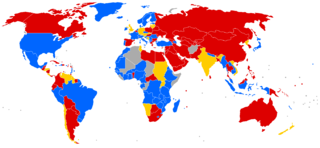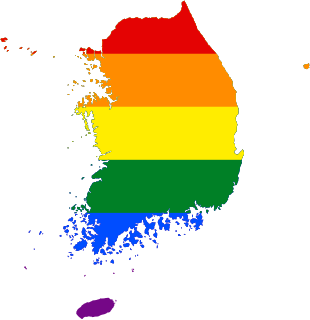
The AIDS epidemic, caused by HIV, found its way to the United States as early as 1960, but was first noticed after doctors discovered clusters of Kaposi's sarcoma and pneumocystis pneumonia in gay men in Los Angeles, New York City, and San Francisco in 1981. Treatment of HIV/AIDS is primarily via a "drug cocktail" of antiretroviral drugs, and education programs to help people avoid infection.

HIV-positive people, seropositive people or people who live with HIV are people who have the human immunodeficiency virus HIV, the agent of the currently incurable disease AIDS.
Criminal transmission of HIV is the intentional or reckless infection of a person with the human immunodeficiency virus (HIV). This is often conflated, in laws and in discussion, with criminal exposure to HIV, which does not require the transmission of the virus and often, as in the cases of spitting and biting, does not include a realistic means of transmission. Some countries or jurisdictions, including some areas of the U.S., have enacted laws expressly to criminalize HIV transmission or exposure, charging those accused with criminal transmission of HIV. Other countries, the United Kingdom for example, charge the accused under existing laws with such crimes as murder, fraud (Canada), manslaughter, attempted murder, or assault.
AIDS service organizations are community-based organizations that provide support for people affected by HIV/AIDS. This article focuses on HIV/AIDS service organizations in the United States only.
The Caribbean is the second-most affected region in the world in terms of HIV prevalence rates. Based on 2009 data, about 1.0 percent of the adult population is living with the disease, which is higher than any other region except Sub-Saharan Africa. Several factors influence this epidemic, including poverty, gender, sex tourism, and stigma. HIV incidence in the Caribbean declined 49% between 2001 and 2012. Different countries have employed a variety of responses to the disease, with a range of challenges and successes.
Angola has a large HIV/AIDS infected population, however, it has one of the lowest prevalence rates in the Southern Africa zone. The status of the HIV/AIDS epidemic in Angola is expected to change within the near future due to several forms of behavioral, cultural, and economic characteristics within the country such as lack of knowledge and education, low levels of condom use, the frequency of sex and number of sex partners, economic disparities and migration. There is a significant amount of work being done in Angola to combat the epidemic, but most aid is coming from outside of the country.
Kenya has a severe, generalized HIV epidemic, but in recent years, the country has experienced a notable decline in HIV prevalence, attributed in part to significant behavioral change and increased access to ARV(antiretroviral drugs). Adult HIV prevalence is estimated to have fallen from 10 percent in the late 1990s to about 4.8 percent in 2017. Women face considerably higher risk of HIV infection than men but have longer life expectancies than men when on ART. The 7th edition of AIDS in Kenya reports an HIV prevalence rate of eight percent in adult women and four percent in adult men. Populations in Kenya that are especially at risk include injecting drug users and people in prostitution, whose prevalence rates are estimated at 53 percent and 27 percent, respectively. Men who have sex with men (MSM) are also at risk at a prevalence of 18.2%. Other groups also include discordant couples however successful ARV-treatment will prevent transmission. Other groups at risk are prison communities, uniformed forces, and truck drivers.

HIV/AIDS in Lesotho constitutes a very serious threat to the Basotho people and Lesotho's economic development. Since its initial detection in 1986, HIV/AIDS has spread at alarming rates in Lesotho. In 2000, King Letsie III declared HIV/AIDS a natural disaster. According to the Joint United Nations Programme on HIV/AIDS (UNAIDS) in 2016, Lesotho's adult prevalence rate of 25% is the second highest in the world, following Eswatini.
HIV/AIDS in Eswatini was first reported in 1986 but has since reached epidemic proportions. As of 2016, Eswatini has the highest prevalence of HIV among adults aged 15 to 49 in the world (27.2%). The HIV/AIDS epidemic in Eswatini, having contributed largely to high mortality rates among productive Swazi age groups. Over the long-term, the epidemic and its respondents induced major cultural changes surrounding local practices and ideas of death, dying, and illness, as well as an expansion of life insurance and mortuary service markets and health-related nongovernmental organizations.

Mozambique is a country particularly hard-hit by the HIV/AIDS epidemic. According to 2008 UNAIDS estimates, this southeast African nation has the 8th highest HIV rate in the world. With 1,600,000 Mozambicans living with HIV, 990,000 of which are women and children, Mozambique's government realizes that much work must be done to eradicate this infectious disease. To reduce HIV/AIDS within the country, Mozambique has partnered with numerous global organizations to provide its citizens with augmented access to antiretroviral therapy and prevention techniques, such as condom use. A surge toward the treatment and prevention of HIV/AIDS in women and children has additionally aided in Mozambique's aim to fulfill its Millennium Development Goals (MDGs). Nevertheless, HIV/AIDS has made a drastic impact on Mozambique; individual risk behaviors are still greatly influenced by social norms, and much still needs to be done to address the epidemic and provide care and treatment to those in need.

HIV and AIDS is a major public health issue in Zimbabwe. The country is reported to hold one of the largest recorded numbers of cases in Sub-Saharan Africa. According to reports, the virus has been present in the country since roughly 40 years ago. However, evidence suggests that the spread of the virus may have occurred earlier. In recent years, the government has agreed to take action and implement treatment target strategies in order to address the prevalence of cases in the epidemic. Notable progress has been made as increasingly more individuals are being made aware of their HIV/AIDS status, receiving treatment, and reporting high rates of viral suppression. As a result of this, country progress reports show that the epidemic is on the decline and is beginning to reach a plateau. International organizations and the national government have connected this impact to the result of increased condom usage in the population, a reduced number of sexual partners, as well as an increased knowledge and support system through successful implementation of treatment strategies by the government. Vulnerable populations disproportionately impacted by HIV/AIDS in Zimbabwe include women and children, sex workers, and the LGBTQ+ population.
HIV/AIDS in El Salvador has a less than 1 percent prevalence of the adult population reported to be HIV-positive, El Salvador and therefore there is a low-HIV-prevalence country, but the virus remains a significant threat in high-risk communities, such as commercial sex workers (CSWs) and men who have sex with men (MSM).
With less than 1 percent of the population estimated to be HIV-positive, Egypt is a low-HIV-prevalence country. However, between the years 2006 and 2011, HIV prevalence rates in Egypt increased tenfold. Until 2011, the average number of new cases of HIV in Egypt was 400 per year. But, in 2012 and 2013 it increased to about 600 new cases and in 2014 it reached 880 new cases per year. According to UNAIDS 2016 statistics, there are about 11,000 people currently living with HIV in Egypt. The Ministry of Health and Population reported in 2020 over 13000 Egyptians are living with HIV/AIDS.However, unsafe behaviors among most-at-risk populations and limited condom usage among the general population place Egypt at risk of a broader epidemic.
The relationship between religion and HIV/AIDS has been an ongoing one, since the advent of the pandemic. Many faith communities have participated in raising awareness about HIV/AIDS, offering free treatment, as well as promoting HIV/AIDS testing and preventative measures. Christian denominations, such as Lutheranism and Methodism, have advocated for the observance of World AIDS Day to educate their congregations about the disease. Some Churches run voluntary blood testing camps and counselling centers to diagnose and help those affected by HIV/AIDS.
Discrimination against people with HIV/AIDS or serophobia is the prejudice, fear, rejection, and stigmatization of people afflicted with HIV/AIDS. Marginalized, at-risk groups such as members of the LGBTQ+ community, intravenous drug users, and sex workers are most vulnerable to facing HIV/AIDS discrimination. The consequences of societal stigma against PLHIV are quite severe, as HIV/AIDS discrimination actively hinders access to HIV/AIDS screening and care around the world. Moreover, these negative stigmas become used against members of the LGBTQ+ community in the form of stereotypes held by physicians.
Partner notification is the practice of notifying the sexual partners of a person, known as the "index case", who has been newly diagnosed with a sexually transmitted infection that they may have been exposed to the infection. It is a kind of contact tracing and is considered a partner service.
Stigma Action Network (SAN) is an international network focused on research, education and advocacy concerning HIV stigma and discrimination reduction.
Discrimination against drug addicts is a form of discrimination against people who suffer from a drug addiction. In the process of stigmatization, drug addicts are stereotyped as having a particular set of undesirable traits, in turn causing other individuals to act in a fearful or prejudicial manner toward them. Drug use discrimination also leads to many users being secretive about drug use. As it relates to healthcare stigmatizing attitudes surrounding drug use can cause barriers to treatment uptake and engagement. In some of its manifestations, discrimination against drug addicts involves a violation of human rights.

The health access and health vulnerabilities experienced by the lesbian, gay, bisexual, transgender, queer or questioning, intersex (LGBTQI) community in South Korea are influenced by the state’s continuous failure to pass anti-discrimination laws that prohibit discrimination based on sexual orientation and gender identity. The construction and reinforcement of the South Korean national subject, “kungmin,” and the basis of Confucianism and Christianity perpetuates heteronormativity, homophobia, discrimination, and harassment towards the LGBTQI community. The minority stress model can be used to explain the consequences of daily social stressors, like prejudice and discrimination, that sexual minorities face that result in a hostile social environment. Exposure to a hostile environment can lead to health disparities within the LGBTQI community, like higher rates of depression, suicide, suicide ideation, and health risk behavior. Korean public opinion and acceptance of the LGBTQI community have improved over the past two decades, but change has been slow, considering the increased opposition from Christian activist groups. In South Korea, obstacles to LGBTQI healthcare are characterized by discrimination, a lack of medical professionals and medical facilities trained to care for LGBTQI individuals, a lack of legal protection and regulation from governmental entities, and the lack of medical care coverage to provide for the health care needs of LGBTQI individuals. The presence of Korean LGBTQI organizations is a response to the lack of access to healthcare and human rights protection in South Korea. It is also important to note that research that focuses on Korean LGBTQI health access and vulnerabilities is limited in quantity and quality as pushback from the public and government continues.




